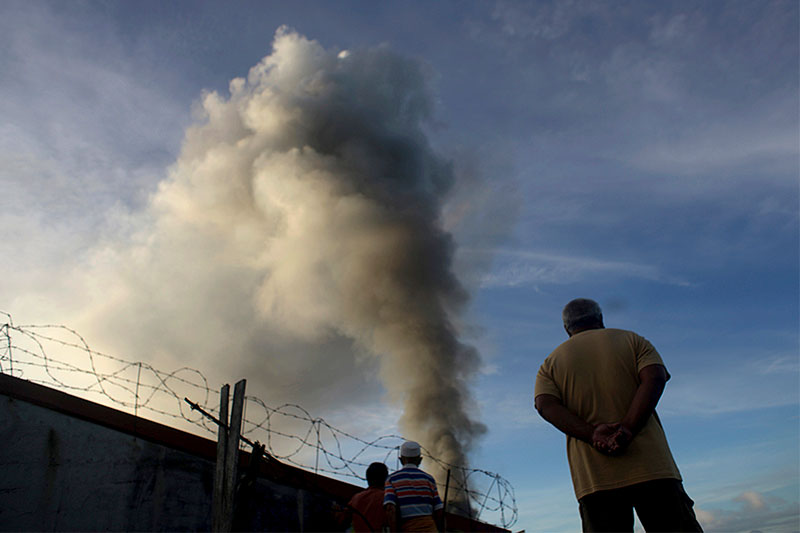Analyst: Southeast Asia anti-terror efforts must start in Marawi

Residents looks at a burning structure during early morning airstrikes by government forces in the continuing fight for Marawi city by Muslim militants Friday, June 23, 2017, in southern Philippines. The siege by militants aligned with the Islamic State group continues as it enters its second month Friday. AP/Linus Guardian Escandor II
MANILA, Philippines — The Southeast Asia region must deepen counter-terror efforts as ISIS-inspired local terror groups lay siege in Mindanao, particularly in Marawi City, an analyst said.
Elliot Brennan, a research fellow at the Institute for Security and Development Policy's Asia Program in Sweden, said the siege in Marawi City must serve as a lesson for the whole region.
On May 23, President Rodrigo Duterte declared martial law and suspended the privilege of the writ of habeas corpus in Mindanao following a clash between government forces and the Maute group.
Brennan noted that the failure of the Armed Forces of the Philippines to act on the Maute group's attack on Marawi despite intelligence report was negligent.
RELATED: Solgen to SC: Marawi siege meant to trigger uprisings
"Its failings since - such as to apprehend the Malay financier of the Marawi campaign, to stop the escape of Hapilon, or simply to quell the insurgency - show a worrying lack of capacity," Brennan said in an article published by Sydney-based Lowy Institute for International Policy.
The policy analyst noted that the fight in Marawi is not actually about the city since many of the militants and funding are from abroad, taking the conflict to a global narrative.
The key to addressing this issue on the regional level would be a disaggregation, delinking and dismantling of militants from around the world.
"A starting point is the doubling down on the promises made in the [Moro Islamic Liberation Front] peace process, such as expediting the Bangsamoro Basic Law through congress in order to convey the message that the government will work more with Mindanao moderates – some important actions to this effect have already been achieved, including a joint AFP-MILF humanitarian corridor in Marawi," he said.
Another measure would be to scale up the joint patrols between the MILF and the military to support a "cooperative narrative."
Humanitarian assistance and disaster relief resources should also be prepared in case limited resources needed to be allocated between protecting the Muslim citizens in the south or the Catholic elsewhere in the country.
"Similar to this is the very real chance of another organized criminal or insurgency group sensing the weakness of a distracted army and creating its own brand of problems," Brennan said.
The president should also stop declining pledged aid money, such as the aid from the European Union. Denying foreign aid would throw recipients into poverty, which may lure them into joining paying Islamic militant groups.
READ: Rejection of EU funding could affect Mindanao peace projects
The last measure would be to put an end to Duterte's war on drugs, "which has proved corrosive to the rule of law" to benefit his "credibility internationally and support the legitimacy of the judicial system."
"All of these measures would ultimately work to strengthen the governance in the southern Philippines, but would also have far wider implications," Brennan said.
The Southeast Asian region must engage and enable grassroots moderates instead of pursuing the trend of top-down authoritarianism, he said.
RELATED: AFP: Hapilon has likely abandoned Maute group
- Latest
- Trending































